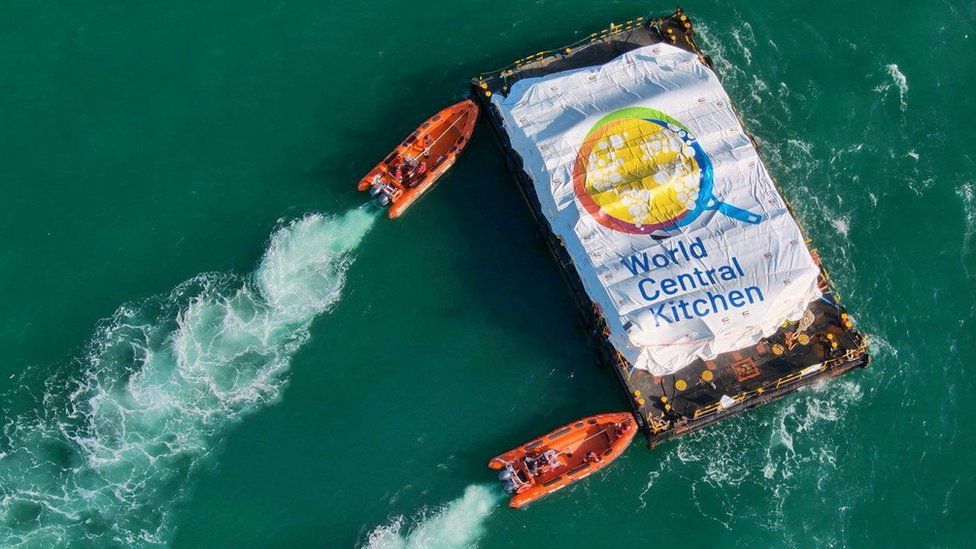Gaza aid reaches shore in first sea delivery
The initial vessel transporting a barge filled with humanitarian assistance to Gaza has offloaded its provisions onto the coast.
Departing from Cyprus on Tuesday, the Spanish ship Open Arms carried 200 tonnes of much-needed food destined for Gaza, a region the UN warns is teetering on the edge of famine.
Online videos depict a crane transferring crates from the barge to waiting trucks at a specifically constructed pier.
This event signifies the commencement of a trial to evaluate the efficacy of sea-based deliveries, following challenges encountered with air and land transport.
World Central Kitchen (WCK), in collaboration with the United Arab Emirates (UAE), orchestrated the delivery of essential supplies, including rice, flour, legumes, canned vegetables, and proteins.
Given Gaza’s lack of a functional port, WCK’s team erected a pier extending from the shoreline. The method of food distribution within Gaza remains uncertain.
Celebrity chef José Andrés, the founder of WCK, confirmed on X (formerly Twitter) that all the food aid from the barge had been transferred to 12 trucks.
“We did it!” he wrote, adding that this was a test to see if they could bring even more aid in the next shipment – up to “thousands of tons a week”.
In a statement, Israel said the Open Arms vessel and its cargo were inspected in Cyprus, and that Israel Defense Forces (IDF) troops had been deployed to secure the shoreline.
The Open Arms charity, which operates the ship, shared the crane video late on Friday, as teams worked through the night to get the aid onto dry land.
This delivery has been highly anticipated since the ship set off from a port in Larnaca on Tuesday.
If this sea mission is deemed a success, other aid ships will likely follow as part of an international effort to get more aid into Gaza. The ships would use a newly opened sea route to travel directly to the region.
Separately, the US is planning to build its own floating dock off the coast to boost sea deliveries. The White House says it could see two million meals a day enter Gaza, but while a military ship is en route with equipment on board to build the dock, questions remain about the logistics of the plan.
Military operations and the breakdown of social order have severely hampered aid distribution, while Gaza’s own food production has been severely affected, with farms, bakeries and factories destroyed or inaccessible.
The quickest, most effective way to get aid into the territory is by road, but aid agencies say Israeli restrictions mean a fraction of what is needed is getting in.
The World Food Programme had to temporarily pause its land deliveries after convoys came under gunfire and looting. And an air drop turned deadly last week when five people were reportedly killed when a parachute failed and they were hit by the aid package.
The UN has warned that famine is “almost inevitable” in Gaza without urgent action, and the EU’s foreign policy chief Josep Borrell has accused Israel of creating a “manmade” disaster and using starvation as a weapon of war.
Israel has vehemently denied it is to blame for Gaza’s food shortages as it is allowing aid through two crossings in the south. Instead, it has blamed aid agencies of logistical failures.
Negotiations for a ceasefire in Gaza are ongoing on Friday, with Israel dismissing the Hamas’ latest ceasefire proposal.


